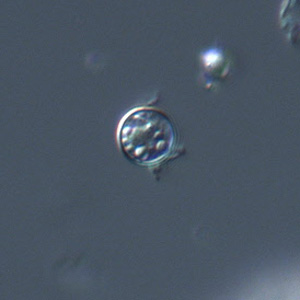The Illinois Department of Public Health (IDPH) continues to work with local, state, and federal public health officials to investigate an increase in the number of Cyclospora illnesses in counties all across Illinois. Since mid-May, IDPH has received confirmation of 266 cases of cyclosporiasis, an intestinal illness caused by the microscopic Cyclospora parasite.

Of those, 110 reported eating salads produced for McDonald’s restaurants in the days before becoming ill. A new outbreak of cyclosporiasis linked to a private event at Evanston Golf Club in Skokie, Illinois, was identified this week. Not all sources of illness have been identified.
“Our investigation includes interviewing people who have become ill to learn what they ate, where they ate it, when, and if there are any commonalities,” said IDPH Director Nirav D. Shah, M.D., J.D. “Additionally, we’re tracing any implicated foods to identify the manufacturer, producer, supplier, distributor, and all other points of contact to identify a source. If you feel like you may have been exposed to a foodborne illness and have symptoms, contact a health care provider.”
Cyclospora is a one-celled parasite too small to be seen with the naked eye (only 8 to 10 microns in diameter). Its full name is Cyclospora cayetanensis.
Cyclospora is spread by a person putting something in his or her mouth that was contaminated with infected stool. For example, the parasite can be transmitted by swallowing contaminated water or food.
Good Morning Snore Solution Mouthpiece Value Pack – $159.94

Image/CDC DPDx
Cyclospora infects the small intestine and typically causes an illness characterized by watery diarrhea, with an average of about six to seven stools per day. Other symptoms can include loss of appetite, weight loss, bloating, increased gas, stomach cramps, nausea, vomiting, tiredness, muscle aches and low-grade fever. Some persons notice flu-like symptoms before they notice the gastrointestinal symptoms. Some persons infected with Cyclospora do not develop any symptoms.
- Cholera outbreak stalks Cameroon
- Preventive vaccination programme reaches 213,000 children in Central African Republic
- Shigella outbreak strikes children’s camp in Donetsk region, Ukraine
- France: Chlamydia and Gonorrhea diagnoses triple since 2012
- Travelers to Kenya warned about Rift Valley fever
- Legionnaires’ cluster in Lower Washington Heights grows to 22 cases


I live in Evanston Illinois and am currently being treated for suspected Cyclospora infection. My physician prescribed Bactrim which I started yesterday July 21.
One week earlier I purchased a pint of raspberries at the wilmette farmers market and consumed most of them myself. I have some remaining ones in the carton and would like to know where to take them to have them checked for oocysts/ DNA. I am a retired parasitologist and not familiar with labs in this area. This would be vital to confirm because these were purchased from local farmers from Michigan, southern Illinois etc. I don’t recall the exact farmer I purchased from.